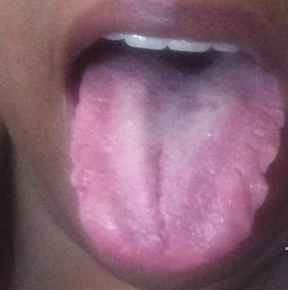The occurence of unusual dents on the sides of a tongue is medically referred to as a scalloped tongue. These dent marks typically form because of excess force of the teeth on the tongue, which causes it to compress.
It is possible for the tongue to become bigger due to infections, inflammation, soreness, and other underlying diseases, etc. Enlargement of the tongue can cause the tongue to press against the teeth for space. This process may eventually give rise to indentations on the side borders of the tongue.
A scalloped tongue has been described in varied ways; as a wavy tongue, rippled tongue, crumples on the side edges, dents on the lateral sides, and teeth marks on the side borders. It is also known by many other names, including pie crust tongue, crenated tongue, lingua indentata, and/or crenulated tongue.
Symptoms of scalloped tongue
A scalloped tongue may be marked with a variety of signs and symptoms as listed below:
- There may be inflammation and swelling of the tongue. The lateral borders may elicit abnormal ridges. The anomalous grooves tend to appear as tooth bites/marks.
- There may be no color changes or discoloration of the tongue. Elevated pressure or friction can however cause redness on the sides of the tongue.
- A scalloped tongue may also be accompanied by different symptoms that are indicative of the underlying disease that caused the tongue to become larger in the first place. These symptoms may include paleness, sore throat, swollen tongue, tongue pain, and bad breath, etc.
Pictures


Causes of scalloped tongue
A scalloped tongue is usually a sign of some underlying condition. By itself, it is not serious and does not cause health problems. The causative conditions such as sinus ailments, arthritis, digestive problems, anxiety, iron deficits, etc., can cause health issues.
Some of the common causes and associated symptoms and treatment options of a scalloped tongue are listed below.
1. Macroglossia
- Macroglossia is a term used to describe a condition of swollen tongue. It can occur due to conditions such as canker sores, oral cancer, tongue cancer, angioedema, amyloidosis, allergies, scarlet fever, and dehydration. A swollen tongue can exert excess pressure on the tongue and make it scalloped. Visit a doctor for diagnosis of the cause of swollen tongue and associated treatment.
2. Hypothyroidism
- Hypothyroidism is a term used to refer to an underactive thyroid gland marked by reduced secretion of the thyroid hormone. It may be noted that the thyroid hormone is instrumental in regulation of varied bodily functions like metabolism, etc. Low levels of thyroid can cause slowdown in varied body activities, thereby cause the tongue and many other glands to become bigger. Hypothyroidism can be present from birth, or it may be triggered by diseases like Hashimoto’s disease, thyroiditis, etc.
- In addition to a scalloped tongue, hypothyroidism may cause symptoms like swollen face, hoarseness, swollen eyelids, depression, thick lips, cold sensitivity, dry skin, fatigue, muscle pain, thinning of hair, and constipation, etc.
- Hypothyroidism is usually treated with thyroid hormone replacement therapy. Other treatment options include radiation therapy, stress managements, osteopathy, acupuncture, homeopathy, naturopathy, biofeedback techniques, and intake of foods rich in vitamin B.
3. Water retention
- Water retention can cause the tongue to swell up and eventually lead to a scalloped tongue. Spleen problems as well as other ailments that adversely affect the process of food and fluids conversion into energy can cause water retention. Consult a doctor for diagnosis and relevant treatment.
4. Temporomandibular joint syndrome
- Also called TMJ syndrome, temporomandibular joint syndrome patients suffer from damage of the temporomandibular joint which hampers the function of the jaw muscles as well as the nerves which join the skull and the jaw.
- The jaw problem and/or associated scattered teeth can make the lower jaw unstable. In such cases, the abnormally narrow jaw can be kept in its position only by clenching the teeth with support from the tongue. It means that the tongue needs to be continuously used to push up the teeth to keep them in place, thereby helping the process of proper chewing and biting and stabilization of the jaw when swallowing. Over a period of time, this activity can lead to development of a scalloped tongue. Thus, even when the tongue is not swollen, the habitual and prolonged process of pressing the tongue against the lower jaw or the teeth for stabilization, etc., can result in eventual formation of grooves on the sides of the tongue.
- In addition to a scalloped tongue, patients of TMJ syndrome may also suffer from headaches, swollen nerves, bruxism, popping or clicking jaw, swollen sides of the face, and painful chewing.
- Remodeling ill-set or ill-fitting teeth and/or surgical correction of the lower jaw can help treated TMJ syndrome.
5. Megaloblastic anemia
- It is blood disorder that causes increased production of anomalous red blood cells. It occurs due to folate and vitamin B12 deficiency. It can cause the tongue to become swollen, thereby resulting in a scalloped tongue. Diet changes to include fish, dairy, poultry, eggs, etc., as well as intake of vitamin B12 and folate supplements can help treat and manage megaloblastic anemia.
